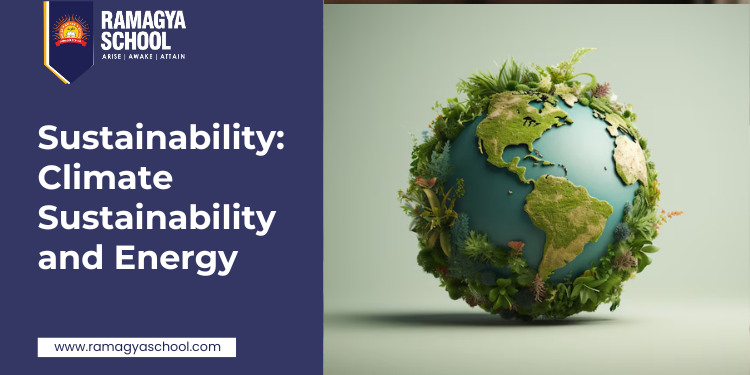The topic of sustainability has gained more attention recently, despite several environmental concerns. The sustainability of our environment, which is focused on protecting our existing environment and ensuring that our actions today aren’t negatively affecting the climate in the future, is one of the key components of sustainability. The issue that comes next is energy, as decisions we make in this area have a big impact on the environment.
- What is Climate Sustainability?
Sustainability in the climate relates to maintaining our environment and our climate by ensuring the protection of humans in the same way as biodiversity and ecosystems.
It’s about cutting down on greenhouse gas emissions like carbon dioxide and preserving natural resources that are valuable and adapting to changing climate conditions that are occurring. The goal is to make sure that Earth is habitable and safe for the next generation.
- Why is Climate Sustainability Important?
- Human health: Extreme weather conditions like floods, heatwaves, and storms can result in injuries, illnesses and even death. Climate change could also impact the availability of water as well as food, which can lead to a decrease in hydration levels for people and malnutrition.
- Biodiversity: The diversity of a wide range of species depend on specific conditions in the climate to ensure their survival. Changes in the environment may result in the destruction of habitats and eventually loss of them. The conservation of the environment is vital to ensure the diversity that exists on Earth.
- Economic Stability and Financial Security: The effect of climate change poses the potential for disturbances to economic activity. Tourism to agriculture, and fishing are particularly vulnerable. If we are able to maintain an even climate we will be able to protect livelihoods and create jobs.
- Environmental Protection: Fertilization, air quality, water, and rich soils are essential services provided by biological systems, which are rooted in a healthy climate. Both human endurance and our general well-being depend on these basic functions.
- Energy’s Place in the Sustainability of the Climate
In addition to a shift towards renewable energy sources improving efficiency of energy is essential to sustain in the face of climate change. Efficiency in energy is the process of using less energy to complete the same job, which reduces the use of energy and greenhouse gas emissions.
Here are some ways to boost energy efficiency:
- Building Design: Construction of energy-efficient structures that are well-insulated, windows that use less energy, modern heating and cooling systems can drastically reduce the use of energy.
- Appliances: Appliances that use less energy, such as LED lighting appliances that are energy efficient, like refrigerators, dishwashers, and washing machines, can save energy.
- Industrial Processes: Industrial Processing that upgrades machinery and equipment to make them more energy efficient will lower energy use and emissions.
- Behavior Changes: Simple actions like shutting out the light when it isn’t being used, lowering the temperature of heating water, and using thermostats that are programmed could make a massive impact.
- Challenges and Solutions
- Costs: Initial costs for renewable infrastructure and energy-efficient technology can be costly. But the savings over time and environmental benefits outweigh the initial costs.
- Technologies: The technologies for renewable power are currently being developed and will require more study and improvement to be more efficient and cost-effective.
- Infrastructure: Integrating renewable energies into existing energy grids isn’t simple and could require significant infrastructure upgrades.
- Regulation and Policy: Effective policies and regulations are crucial to facilitate the shift towards renewable energy sources and improve efficiency in the field of energy. The government plays an important part in establishing standards in providing incentives, as well as facilitating research.
- Practical Steps We Can Take
- Choose Renewable Energy: Choose solar panel installation, support wind energy projects, and choose renewable energy sources if available.
- Improve energy efficiency: Change the appliances you have to efficient models or to insulate your home, and implement strategies for energy savings.
- Transportation: Encourage sustainable transportation by using bicycles, public transportation, or walk. You can also use electric or fuel-efficient cars.
- Advocates for Policies: Advocate for policy and rules that promote sustainable use of renewable energy sources as well as efficiency in energy use and green development for the environment.
- Inform and increase awareness: Awareness of the significance of sustainability in the context of climate change and the steps we can adopt to achieve it.
- Reduce, Reuse, and Recycle: Try to live a more sustainable lifestyle by reducing the waste, recycling materials as well as reusing them and recycling whenever possible.
- Conserve water: Implement water-saving measures, such as fixing leaks, installing fixtures with low flow, as well as paying attention to the consumption of water.
- Plant trees and protect forests: The trees absorb carbon dioxide. They also offer numerous environmental advantages. Support reforestation projects and protect existing forests.
- Support Sustainable Agriculture: Choose local-grown food items, reduce the consumption of animal products, and encourage organic farming methods.
- Participate: Join environmental groups to take part in community cleanup events and stay informed about climate-related issues.
Conclusion
Energy and environmental sustainability are closely related topics that need prompt thought and action. It is possible to significantly reduce our impact on the environment and help ensure a reasonable future for a very long time by adopting sustainable power sources, increasing energy efficiency, and choosing decisions that are innocuous to the ecosystem in our daily lives.
Sustainability in the fight against environmental change necessitates a cooperative effort involving individuals, groups, and government agencies. Everyone can make a difference, and by directing efforts in the proper direction, we may help create a society that is both tough and naturally possible. Let’s take action and contribute to our planet and future generations.





